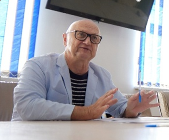
| Prof. Haiming Luo Professor of Wuhan National Laboratory for Optoelectronics, Huazhong University
of Science and Technology (HUST), China
Research Interests: Neurodegenerative Diseases, Nerve Regeneration, In Vitro Diagnostics, Optical Imaging of Neurotumors, Alzheimer's Disease and Glioma
| Prof. Haiming Luo is a full professor at the Britton Chance Center for Biomedical Photonics, Wuhan National Laboratory for Optoelectronics, Huazhong University of Science and Technology (HUST), China. From October 2013/10 to 2015/10, he was post-doctoral in the University of Wisconsin-Madison (Tutor: Prof. Weibo Cai). From 2015/10 to 2018/03, his post-doctoral training was in the Massachusetts General Hospital (Tutor: Annie W. Chan) . From 2016/10 to 2018/03, he worked in the McGovern Institute for Brain Research (Tutor: Professor Feng Guoping). Since 2018/04, he has been working in the Wuhan National Laboratory for Optoelectronics. His awards includes the The Youth Thousand Talents Plan and China's Military (2018); The 8th batch of youth programs of the Hundred Talents Program in Hubei Province (2018); Alavi Mandell Award from Society of Nuclear Medicine and Molecular Imaging (2016-2017); Young Scientist Award of the Chinese American SNMMI (2016); Radiopharmaceutical Sciences Council (RPSC) travel grant (2015); Excellent Doctoral Dissertation of Hubei Province (2014).
| | |  
| Prof. Bukin Oleg Professor of Maritime State University, Russia
Research Interests: WMechanism of laser radiation interaction with matter, Ocean optics. Laser methods of monitoring of ocean and atmosphere, monitoring of oil pollution at sea, influence of the pollution on phytoplankton community, development of laser methods and artificial intelligence for marine robotics (ROV, AUV)
| Professor Oleg Bukin has more than 252 publications, which have been cited 1,925 times, has an h-index of 20 (based on data from E-library and the Russian Science Index). Professor Bukin is a member of the reviewer boards of such journals as the Sensors, and Remote Sensing. Additionally, he was a guest editor for the Special Issue titled "Laser Sensing in Robotics" in the Applied Sciences (MDPI) in 2021. Also, he is a member of the editorial board of journals Atmosphere and Ocean Optics, Operation of Maritime Transport, Asia-Pacific Journal of Marine Science & Education. Professor Bukin is listed as a scientist with great achievements in the Who is Who collection. Also, he organized and was scientific advisor of the research and educational project "Far Eastern Floating University" from 1996 to 2017. He organized and provided more than 20 scientific and educational expeditions, including the circum navigation in 2003-2004 and the Arctic expedition in 2013. The project was awarded by the Russian Geographical Society as the Best Scientific Expedition in 2014. Professor Bukin is specialized in "Laser Physics". He prepared and supervised 20 theses of candidate of sciences and 4 theses of doctor of science. Furthermore, he received the "Leading Scientific Schools of the Russian Federation" grant from the Government of the Russian Federation 2010 – 2012. |
|
|
|
|
|
|
|
|
| | | | 
| Prof. Jinbo Pang Professor of Chemistry and Materials Science, Institute for Advanced Interdisciplinary Research (iAIR), University of Jinan (UJN), China Research Interests: Wafer-scale controlled growth of two-dimensional materials and their electronic and optoelectronic device applications, Precise control in synthesis of 2D materials such as graphene, WSe2 and assembly of their van der Waals heterostructures, gas sensors, supercapacitors, thin film solar cells, pulsed lasers, electronic skin, and wearable electronics. |
Prof Dr Jinbo Pang directed his research to wafer-scale controlled growth of two-dimensional materials and their electronic and optoelectronic device applications in University of Jinan since 2018. He graduated from Qingdao University (Bachelor) in 2008 (Electronics), Nankai University (Master) in 2011 (microelectronics and solid state electronics), University of Wuerzburg (Research Associate in Physical Chemistry) (2011-2013), Technische Universität Dresden (Germany) (PhD) in 2017 in materials science with thermal deposition approaches for graphene growth. After his study of two-dimensional materials transition metal dichalcogenides in IFW Dresden as a post doctorate, he joined Institute for Advanced Interdisciplinary Research (iAIR), University of Jinan, China as an assistant professor (in 2018) and associate professor (since 2022). This led to the award of Natural Science Fund for Excellent Young Scholars of Shandong Province. He also hosts a NSFC grant and other two funding. Dr. Pang served as a member of Youth Editorial Board of the journal eScience (published by Elsevier) , Frontiers of Chemical Science and Engineering (by Springer), InfoMat (by Wiley), Brain-X (by Wiley), Tungsten (by Springer), and Chinese Journal of Structural Chemistry (by Elsevier). He has served in organizing and scientific/academic/program committee/TPC and co-chair of several international conferences. He has published over 70 journal papers with a total citation of 4468, an h index of 35 (until Feb 21, 2023). Website: http://faculty.ujn.edu.cn/pangjinbo/en and https://orcid.org/0000-0001-6965-4166 and https://www.webofscience.com/wos/author/rid/B-3972-2010
|
|
|
|
|
|